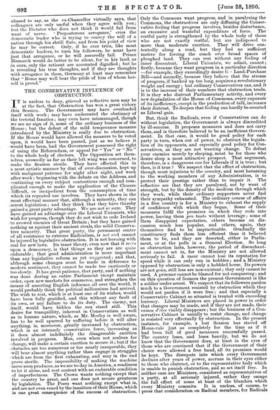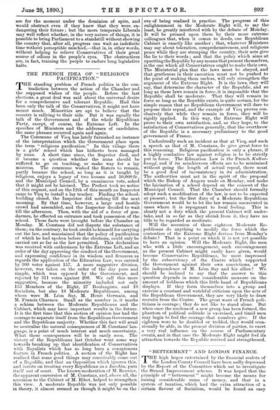THE CONSERVATIVE INFLUENCE OF OBSTRUCTION.
TT is useless to deny, grieved as reflective men may be at the fact, that Obstruction has won a great victory this Session. The Government may have overloaded itself with work ; may have underrated the obstinacy of the teetotal fanatics ; may even have mismanaged, though we see no sign of it, some of the ordinary business of the House ; but the defeat of the mild temperance measure introduced by the Ministry is really due to obstruction. If the House would have allowed the measure to be voted .upon, it would have been passed, just as we believe it 'would have been, had the Government possessed the right of using the Referendum, or appeal for " Yes " or " No " to the whole body of electors. The Opposition set them- selves, avowedly as far as their left wing was concerned, to -make the Session sterile. They have effected this in a most artistic manner by dint of over-discussion, kept up -with malignant patience for night after night, and week -after week ; beginning with the debate on the Address, and - continuing on every subject contentious enough and com- plicated enough to make the application of the Closure difficult, or inexpedient from the consumption of time which its repeated use involves. They have shown in the most effectual manner that, although a minority, they can arrest legislation ; and they think that they have thereby :gained a great party advantage. We are not so sure. They have gained an advantage over the Liberal Unionists, who wish for progress, though they do not wish to cede Ireland . to avowed enemies of Great Britain ; but they have gained nothing as against their ancient rivals, the solid Conserva- tive minority. That great party, the permanent centre of all resistance to extreme Radicalism, is not and cannot be injured by legislative obstruction. It is not burning with zeal for new laws. Its inner theory, even now that it rests upon a democracy, is that things as they are are quite ,endurable ; that good administration is more important than any legislative reform as yet suggested ; and that, although some changes must be made in deference to modern sentiment, they cannot be made too cautiously or too slowly. It has great patience, that party, and if nothing was done during an entire Parliament except maintain -order, open new markets for commerce, and strengthen the .means of asserting English influence all over the world, it would probably think the political millennium had arrived. The wish to rest, which is at least one of its wishes, would have been fully gratified, and this without any fault of .its own, or any failure to do its duty. The enemy, not -itself, would have bidden the sun stand still. This desire for tranquillity, inherent in Conservatism as well as in human nature, which, as Mr. Morley is well aware, has to be well spurred by suffering before it will alter anything, is, moreover, greatly increased by obstruction, which is an intensely conservative force, increasing as it does almost indefinitely the disagreeable exertion involved in progress. Men, even when not zealous for .‘change, will make a certain exertion to secure it ; but if the -obstacles are too numerous or too nearly insuperable, they will bear almost anything rather than engage in struggles 'which are from the first exhausting, and may in the end .prove sterile. The impossibility of making the machine move soon produces, as we see to-day in America, a readiness to let it alone, and rest content with an endurable condition of imperfectness. The Crown wants nothing except that the country be great, and one does not secure greatness by legislation. The Peers want nothing except what is, and are not even vexed by the inanition of their House, which as one great consequence of the success of obstruction.
•
Only the Commons want progress, and in paralysing the Commons, the obstructives are only diffusing the Conser- vative feeling that progress involves, besides disturbance, • an excessive and wasteful expenditure of force. The restful party is strengthened by the whole body of those who are not exactly restful, but are indisposed to more than moderate exertion. They will drive con- tentedly along a road, but they feel no sufficient motive for forcing the coach over broad spaces of ploughed land. They can rest without any feeling of inner discontent. Liberal Unionists, we admit, cannot ; firstly, because they want progress in a particular direction —for example, they exceedingly desire C. Land-Purchase Bill—and secondly, because they believe that the stream of progress, if banked up too long, acquires a revolutionary weight and energy ; but ordinary Conservatives can, and it is to the increase of their numbers that obstruction tends. It is they who distrust Parliamentary activity, and every new degradation of the House of Commons, every exposure of its inefficiency, except in the production of talk, increases their distrust. To deepen that feeling can hardly be counted as Liberal gain.
But, think the Radicals, even if Conservatives can do without legislation, the Government is always discredited by ill-success. It proposes measures and does not carry them, and is therefore believed to be an inefficient Govern- ment. In that case, it would be good policy for each party in turn, when out of power, to obstruct the legisla- tion of its opponents, and especially good policy for Con- servatives, as they are not wanting change. To defeat your enemies merely by sleeping, must be for those who desire sleep a most attractive prospect. That argument, therefore, is a dangerous one for Liberals if it is true ; but then, is it true ? We suspect that the effect of obstruction, though most injurious to the country, and most harassing to the working members of any Administration, is to protect their prestige rather than to impair it. The reflective see that they are paralysed, not by want of strength, but by the density of the medium through which they work, while their ordinary supporters never find their sympathy exhausted. The ordinary course of affairs in a free country is for a Ministry to exhaust the supply of confidence with which they began. ' Some of their measures fulfil the promises on which they rode into power, leaving them pro tanto without leverage ; some of them disappoint expectation, others become on dis- cussion much less popular, and others, again, they themselves find to be impracticable. Gradually the constituency finds them less efficient than it believed them to be, and they are deserted, either in Parlia- ment, or at the polls in a General Election. So long as obstruction lasts, however, the period of disenchant- ment cannot set in, for the Ministry are not allowed seriously to fail. A racer cannot lose its reputation for speed while it can only run in bobbles ; and a Ministry opposed by obstruction is only a hobbled horse. Its powers are not gone, still less are non-existent ; they only cannot be used. A prisoner cannot be blamed for not conquering ; and on this question of licences the present Government is like a soldier under arrest. We suspect that its followers pardon much to a Government resisted by obstruction which they would not pardon if it were free ; and that especially a Conservative Cabinet so situated is treated with exceeding leniency. Liberal Ministers are placed in power in order that changes may be made, and if they are not made, their raison d'être visibly disappears ; but the business of a Con- servative Cabinet is usually to resist change, and change is resisted very effectually by obstruction. In the present instance, for example, a lost Session has staved off Home-rule just as completely for the time as if it had been full of good measures successfully passed. The country loses, and loses heavily, but we do not know that the Government does, at least in the eyes of those who are convinced that if the Government of their choice were allowed a free hand, all its promises would. be kept. The disrepute into which every Government declines after years of power, accrues in their eyes either to those who obstruct, or to the representative body which is unable to punish obstruction, and so set itself free. In neither case are Ministers, considered as representatives of a party, at all seriously injured, rather they escape the full effect of some at least of the blunders which every Ministry commits. It is useless, of course, to press that consideration on Radical members, for Radicals are for the moment under the dominion of spite, and would obstruct even if they knew that they were_ en- dangering their future ; but the more temperate Liberals may well reflect whether, in the very nature of things, it is possible to bring Parliament to a standstill without showing the country that, after all, progress can wait an indefinite time without perceptible mischief,—that is, in other words, without helping to relieve Conservatives of their great source of odium in the people's eyes. The obstructives are, in fact, training the people to endure long legislative halts.



















































 Previous page
Previous page